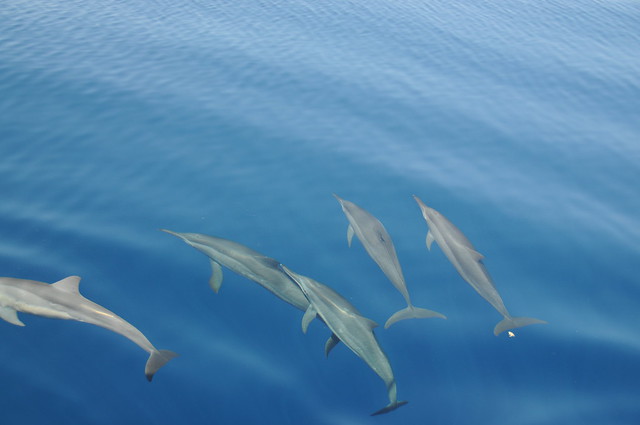Animal News
by ·

In a press release, India’s Ministry of Environment and Forests states that they’ve advised any proposal to open a dolphinarium be rejected.
“Whereas cetaceans in general are highly intelligent and sensitive, and various scientists who have researched dolphin behavior have suggested that the unusually high intelligence; as compared to other animals means that dolphin should be seen as ‘non-human persons’ and as such should have their own specific rights and is morally unacceptable to keep them captive for entertainment purpose,”Cetaceans (whales, dolphins and porpoises) are known to be incredibly intelligent, despite not sharing a common language with humans. We know that they form family bonds, grieve their dead and communicate with each other. India declaring them to be non-human persons is a huge leap forwards in hopefully protecting them from wholesale slaughter and exploitation.
When I was a toddler, barely two years old, our family spent a lot of time by the sea. The story goes, I was running hard towards the jetty when I tripped, fell, and chipped my tooth. Screaming in pain, my mother tried to console me, by letting me know that I would upset the dolphins. Sure enough, a dolphin popped up in front of us and looked concerned until my mother reassured it that I was okay.
It’s one of those things isn’t it – a dolphin heard me screaming and surfaced to check that I was okay. Fishermen and divers tell stories their encounters with whales; about the shared connection the eye contact contains. Folklore abounds with stories of shipwrecked men saved by dolphins.
There’s no doubting that animals are intelligent, and that cetaceans are some of the most intelligent creatures out there. Dolphins are one of the few mammals, aside from humans, that engage in intercourse for fun, rather than just for procreation.
Humans are arrogant, as a species. We’d like to think that we’ve got the jump on all other creatures; that our society is the most developed because we have science and technology. What if we’re wrong?
We can’t communicate with dolphins yet. We can’t know what their culture is like; how their brains work.
But with India making this huge step forwards – a step that other countries should be encouraged to emulate, we can begin to lose some of our arrogance. Not all peoples speak the same language, and now it appears that not all peoples are human.
We know we can teach orangutans and apes to communicate through computers, yet we still destroy their homes. We know that dolphins have language and intelligence, yet we still allow atrocities such as those seen in The Cove to occur. We know these things, but I don’t think we have understood them in our souls yet.
This step from India bodes well for our future. The first step to understanding a culture that isn’t ours comes from realising the culture exists. If humans were better at this, the Englishmen landing in Australia for the first time wouldn’t have gone on to slaughter the Aborigines.
The ocean covers 70% of this planet. This gives us only 30% of the space to hold dominion over.
And really, is it so far fetched that cetaceans are non-human persons?

No comments:
Post a Comment